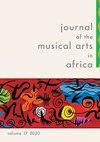Mauritian music therapy: conceptual framework of a promising movement
IF 0.2
4区 艺术学
0 MUSIC
引用次数: 0
Abstract
Stella clavisque Maris Indici (Star and key of the Indian Ocean)1 is the official motto of this young and flourishing republic,2 which has an eventful history, a colourful culture and striking ethnic hallmarks. Looking back over challenging times under Dutch, French and British colonial rule, the multicultural features of the Republic of Mauritius are also mirrored in a promising new movement: Mauritian music therapy (MMT). Although music therapy is not yet recognised as a clinical therapy or an autonomous discipline in Mauritian public health and educational systems, there is a growing awareness of the need for music therapy in psychiatric, paediatric and educational, geriatric, neurorehabilitative and other public health domains. Additionally, local issues such as the depression-related distress of adolescent Mauritian girls (Pillay, Bundhoo & Bhowon 2010) and self-harm and suicide among young Mauritians (Naga 2007; Mauritius Research Council 2015) remain challenging. To deal with pressing psychological, psychiatric and humanitarian issues, the Mauritius Mental Health Association was founded in 1959, when the island was still a British colony. Raising public awareness of mental illness and disability was the main aim at that time, and MMT addresses similar challenges today: to enhance public awareness and understanding of the health-promoting and curative potential of music. In 1974 the Mauritius Mental Health Association was recognised in legislation passed by Parliament. Core objectives of this governmental association are to promote satisfactory education for children with intellectual disabilities, to assess and develop their intellectual and functional capacities, to enhance their potential for inclusion in society, and to give support to their families.毛里求斯音乐疗法:一个有前途的运动的概念框架
“印度洋之星与钥匙”(Stella clavisque Maris Indici)是这个年轻而繁荣的共和国的官方格言。这个国家有着丰富多彩的历史、丰富多彩的文化和鲜明的民族特色。回顾在荷兰、法国和英国殖民统治下的充满挑战的时代,毛里求斯共和国的多元文化特征也反映在一个有前途的新运动中:毛里求斯音乐疗法(MMT)。尽管在毛里求斯的公共卫生和教育系统中,音乐疗法尚未被公认为临床疗法或自主学科,但人们越来越意识到精神病学、儿科和教育、老年病学、神经康复和其他公共卫生领域对音乐疗法的需求。此外,当地问题,如毛里求斯青少年女孩的抑郁相关的痛苦(Pillay, Bundhoo & Bhowon 2010)和毛里求斯年轻人的自残和自杀(Naga 2007;毛里求斯研究委员会2015)仍然具有挑战性。为了处理紧迫的心理、精神病学和人道主义问题,毛里求斯心理健康协会于1959年成立,当时该岛仍是英国殖民地。提高公众对精神疾病和残疾的认识是当时的主要目标,而现代音乐艺术节今天解决了类似的挑战:提高公众对音乐促进健康和治疗潜力的认识和理解。1974年,议会通过的立法承认毛里求斯精神卫生协会。这个政府协会的核心目标是促进智障儿童获得满意的教育,评估和发展他们的智力和功能能力,提高他们融入社会的潜力,并为他们的家庭提供支持。
本文章由计算机程序翻译,如有差异,请以英文原文为准。
求助全文
约1分钟内获得全文
求助全文

 求助内容:
求助内容: 应助结果提醒方式:
应助结果提醒方式:


